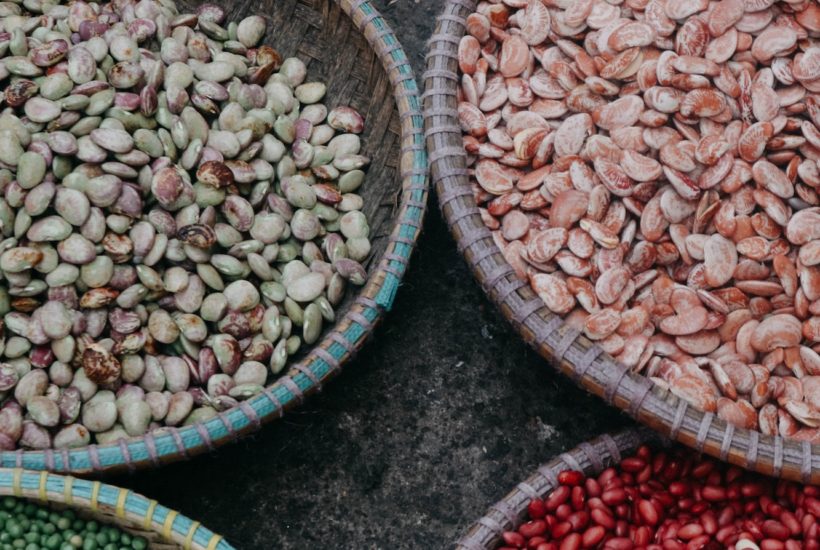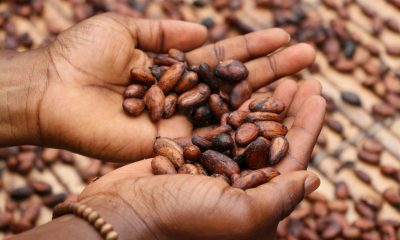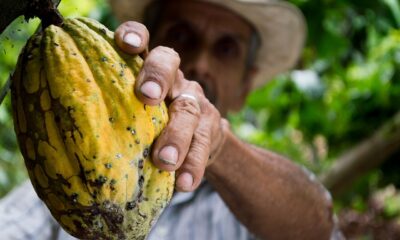Africa
Côte d’Ivoire and Ghana want to create a cocoa OPEC to support farmers
Côte d’Ivoire and Ghana, are teaming up to impose a $400 premium on each tonne of cocoa sold. The aim, to support farmers during lean periods. Prices have risen by more than 20% since last August and reached the mark of $2,570 per tonne. Côte d’Ivoire and Ghana, countries known for being the two largest producers of beans in the world, want to join forces to control prices.

With the end of the year festivities over, Easter is now the focus point for industrialists and chocolate craftsmen. At the checkout, consumers might have the unpleasant surprise of having to pay a little extra for their chocolate eggs and rabbits than usual.
Since August, cocoa prices have risen by more than 20% to $2,570 per tonne. Even though prices have been declining after peaking at $2,681 in mid-November, the general upward trend could continue. The two largest producers in the world, Côte d’Ivoire and Ghana, which produce more than 60% of the world’s beans (ahead of Nigeria and Ecuador), want to join forces on the Opec model in order to control prices.
The Born2Invest mobile app delivers breaking news and trusted, in-depth reporting from Africa and the rest of the world. Get all economic news, business strategies, and many other trending news for you to keep informed.
A fund for lean times
Their plan is to impose a premium of $400 per tonne sold starting in October 2020. Beyond a price of $2,900, the money would be channeled into a fund to support the industry during lean periods. Through this premium, Côte d’Ivoire and Ghana want to better remunerate farmers who have been hit hard by the collapse of prices in 2017. Due to over-abundant harvests, the ton had fallen to $1,780.
A first steps towards the formation of a cartel was taken in October 2018 when Côte d’Ivoire and Ghana harmonized the prices paid to farmers, whose conditions are far from appealing. According to the World Bank, 80% of farmers in the cocoa sector live on less than $3 a day. They capture just 5.5% of this market valued at more than $100 billion a year, while the governments of consumer countries captures 15% of the market with VAT on chocolate bar sales alone.
Industrialists are not opposed, but skeptical
Industrialists and traders (Mars, Mondelez, Cargill, Nestlé, Barry Callebaut, Olam…) are not against the principle of a better remuneration for the farmers. Especially for products that benefit from fair or sustainable trade labeling. However, they are more skeptical about the modalities proposed by Côte d’Ivoire and Ghana.
JP Morgan’s analysts entered into discussions with Hershey’s executives in order to understand the situation. Hershey’s, which manufactures Smarties and KitKat for Nestlé explained that”is not convinced that the cartel is the ideal mechanism to achieve this goal; however, Hershey’s does not seem to be opposed to it, even if its implementation could lead to higher costs,”. Experts from the American bank pointed out in passing that Hershey’s has historically always maintained its margins by passing on the increased costs of its raw materials to consumers.
More generally, ING’s experts doubt the effectiveness of this measure over time. “It should support the market in the short term but, in the longer term, these higher prices are likely to increase production and therefore supply on the market.” Commerzbank analysts concede that they have difficulty measuring the impact on prices, especially since “some observers believe that the new rule may be abolished after the presidential and legislative elections in both countries at the end of 2020.”
Given the uncertainty surrounding the global economy artificial pricing mechanisms could lead to larger problems in the long term, especially as unlike oil cocoa is not a finite product. Despite these concerns it is evident that farmers require higher compensation and that consumers will likely need to get used to high prices.
__
(Featured image by Benjamin Child via Unsplash)
DISCLAIMER: This article was written by a third party contributor and does not reflect the opinion of Born2Invest, its management, staff or its associates. Please review our disclaimer for more information.
This article may include forward-looking statements. These forward-looking statements generally are identified by the words “believe,” “project,” “estimate,” “become,” “plan,” “will,” and similar expressions. These forward-looking statements involve known and unknown risks as well as uncertainties, including those discussed in the following cautionary statements and elsewhere in this article and on this site. Although the Company may believe that its expectations are based on reasonable assumptions, the actual results that the Company may achieve may differ materially from any forward-looking statements, which reflect the opinions of the management of the Company only as of the date hereof. Additionally, please make sure to read these important disclosures.
First published in LesEchos, a third-party contributor translated and adapted the article from the original. In case of discrepancy, the original will prevail.
Although we made reasonable efforts to provide accurate translations, some parts may be incorrect. Born2Invest assumes no responsibility for errors, omissions or ambiguities in the translations provided on this website. Any person or entity relying on translated content does so at their own risk. Born2Invest is not responsible for losses caused by such reliance on the accuracy or reliability of translated information. If you wish to report an error or inaccuracy in the translation, we encourage you to contact us.

-

 Africa4 days ago
Africa4 days agoFrance and Morocco Sign Agreements to Boost Business Mobility and Investment
-

 Impact Investing2 weeks ago
Impact Investing2 weeks agoItaly’s Listed Companies Reach Strong ESG Compliance, Led by Banks and Utilities
-

 Fintech1 day ago
Fintech1 day agoFindependent: Growing a FinTech Through Simplicity, Frugality, and Steady Steps
-

 Impact Investing1 week ago
Impact Investing1 week agoCDP Approves €1.5 Billion Package to Boost Industry, Renewables, and International Development






![RDE, Inc. [ OTC: RSTN ] is set to soar in a perfect storm](https://born2invest.com/wp-content/uploads/2024/02/pexels-burak-the-weekender-187041-400x240.jpg)
![RDE, Inc. [ OTC: RSTN ] is set to soar in a perfect storm](https://born2invest.com/wp-content/uploads/2024/02/pexels-burak-the-weekender-187041-80x80.jpg)
















